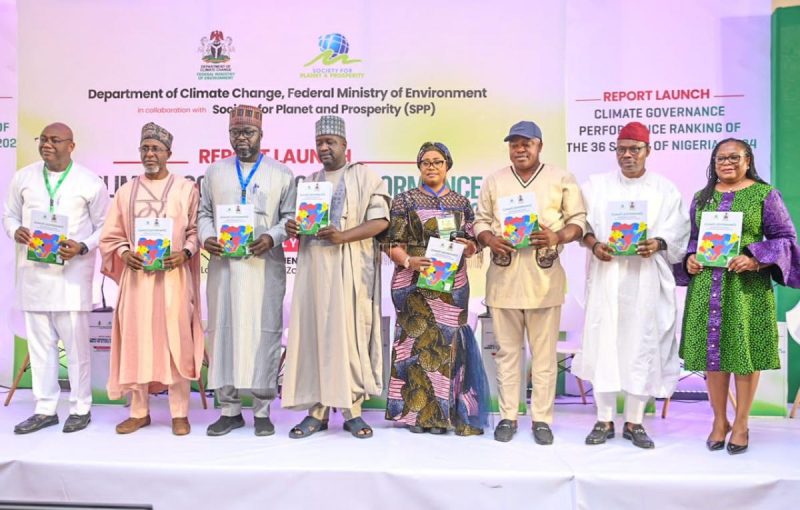The Society for Planet and Prosperity (SPP)inaugurated a Review Panel on July 8, 2025, to review the methodology and scoring matrix for the forthcoming second edition of the Climate Governance Performance Rating and Ranking of Nigeria’s 36 states.

The Review Panel was carefully invited to provide advisory on the methodology and scoring matrix with a view to improving it and ensuring transparency and objectivity in the overall evaluation process.
During the virtual Inauguration session of the Review panel, Prof. Chukwumerije Okereke welcomed the distinguished experts and expressed gratitude for their willingness to contribute their time and expertise in service of the collective goal of improving climate action, especially at the subnational level.
He emphasised the need to continually strengthen the ranking process to better reflect what states are doing to tackle climate change and to inspire greater climate ambition.
Prof. Okereke added that there is need to enhance and improve the process to ensure that it delivers its core objective of accurately shining a spotlight on what states are doing to combat climate change and to motivate them to do more.
“There is a growing consensus that in contexts where legislation may be weak, tools like climate governance rankings can help stimulate accountability and progress,” he said.
“I am delighted that you have accepted to be part of this expert review panel. In a political environment where legislation is not strong, one way to improve climate governance is through climate governance ranking. While no one tool is sufficient, the subnational ranking has gained traction and credibility following the success of the inaugural ranking, helping to stimulate accountability and progress. Your contributions as experts will be critical to ensuring its continued relevance and effectiveness,” he added.
Dr. Iniobong Abiola-Awe, the Director, Department of Climate Change, Federal Ministry of Environment, reiterated the commitment and support of the Federal Ministry of Environment to the Climate Governance Performance Rating and Ranking of Nigeria’s 36 states, and re-assured that states are better empowered to drive climate action, while encouraging other relevant stakeholders and experts to be part of the process of empowering subnational governments.
“I appreciate the SPP team for their commitment to the success of this subnational ranking. Following the success of the first ranking, we have seen a number of states share best practices to ensure that climate policies are enacted and implemented in their states,” she added.
Participants commended the progress in climate change initiatives at the subnational level, while emphasising the importance of measuring governance commitment and tracking implementation impacts.
Dr. Priscilla Achakpa highlighted the need for states to prioritise climate change governance and expressed appreciation for the platform, which she noted has set a precedent for subnational climate action in Nigeria.
Prof. Chinedum Nwajiuba lauded the initiative as a welcome development in improving climate governance at the subnational level, stating that what cannot be measured cannot be improved.
In her contribution, Mrs. Halima Bawa noted that while projects undertaken at the subnational level such as solar panel installations are important, she emphasised the need to prioritise nature-based solutions, especially forest conservation and reforestation.
Other participants acknowledged the progress made at the subnational level, highlighting the importance of evaluating governance frameworks and tracking the impact of their climate actions and policies.
Dr Eugene Itua commended the efforts of the SPP and DCC team from the first edition and kickstarting the second edition.
The panel’s recommendations are expected to inform the revised framework for the upcoming edition of the ranking, which will build on the success of the inaugural report to deepen climate ambition and implementation at the state level.
The expert review panel is composed of Prof. Chinedu Nwajiuba, Chair of the Board, West African Science Service Centre on Climate Change and Adapted Land Use (WASCAL); Prof. Olukayode Oladipo, Adjunct Professor, UNILAG; Prof. Daniel Gwary, University of Maiduguri; Dr.Eugene Itua, CEO, Natural Ecocapital; Mrs Halima Bawa, Director, National Council Climate Change Secretariat; Dr. Pricilia Achakpa, Global President of the Women Environment Programme (WEP); Mr. Olumide Idowu, Executive Director, International Climate Change Development Initiative; Mr. Amara Nwankpa, Director General (Acting) Shehu Musa Yar’Adua Foundation; Mr. Eghose Omoigui and Madam Gbemisola Akosa, Executive Director Centre For 21st Century Issues (C21st).
By Ugochukwu Uzuegbu, Communication Specialist, SPP
